Comprehensive Report on the UK Legal System for Business Law (BMP4002)
VerifiedAdded on 2022/11/28
|8
|2375
|378
Report
AI Summary
This report provides a comprehensive overview of the UK legal system, tailored for business law applications. It begins by defining laws and identifying the legal systems within the UK, differentiating between civil and criminal law and outlining the structure of the UK judiciary, including the Supreme Court and High Court. The report then delves into the sources of law, categorizing them into primary sources like legislation and case law, and secondary sources such as legal encyclopedias, parliamentary publications, law commission reports, and textbooks. Finally, the report examines the UK law-making process, with a specific focus on employment law, detailing the relevant acts, employer and employee duties, and legal dismissal or wrongful termination. The conclusion summarizes the key aspects of the legal system and its impact on business operations.
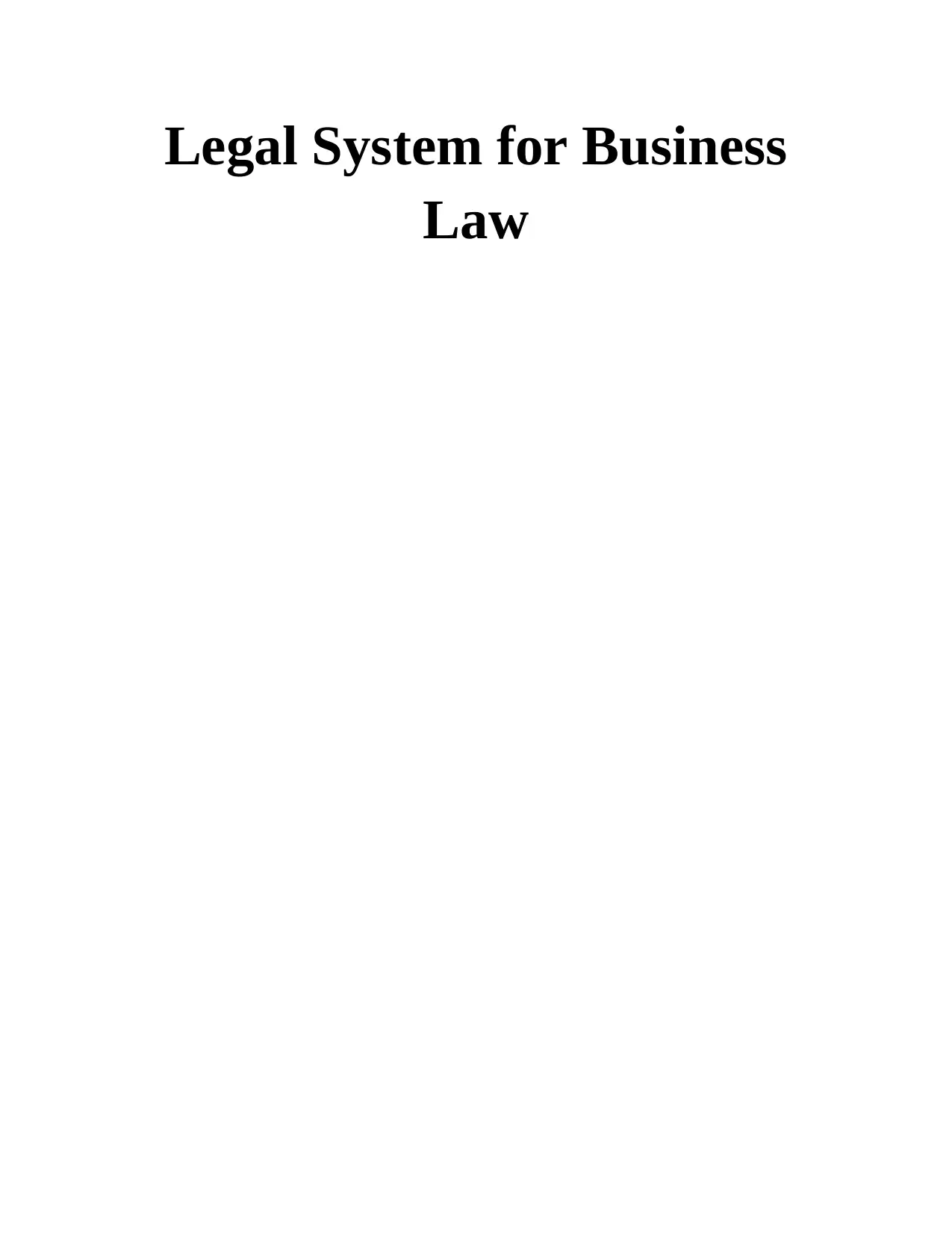
Legal System for Business
Law
Law
Paraphrase This Document
Need a fresh take? Get an instant paraphrase of this document with our AI Paraphraser
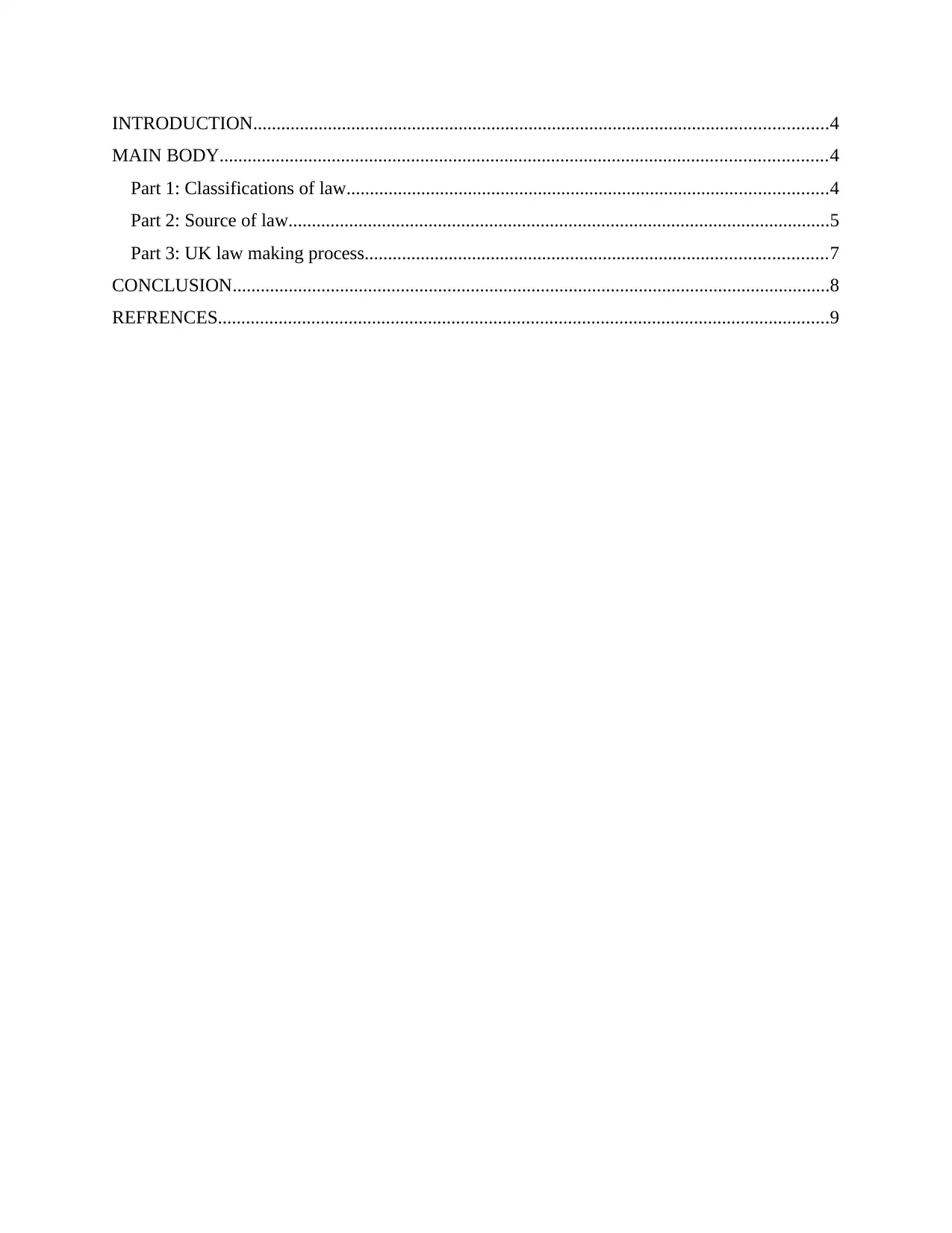
INTRODUCTION...........................................................................................................................4
MAIN BODY..................................................................................................................................4
Part 1: Classifications of law.......................................................................................................4
Part 2: Source of law....................................................................................................................5
Part 3: UK law making process...................................................................................................7
CONCLUSION................................................................................................................................8
REFRENCES...................................................................................................................................9
MAIN BODY..................................................................................................................................4
Part 1: Classifications of law.......................................................................................................4
Part 2: Source of law....................................................................................................................5
Part 3: UK law making process...................................................................................................7
CONCLUSION................................................................................................................................8
REFRENCES...................................................................................................................................9
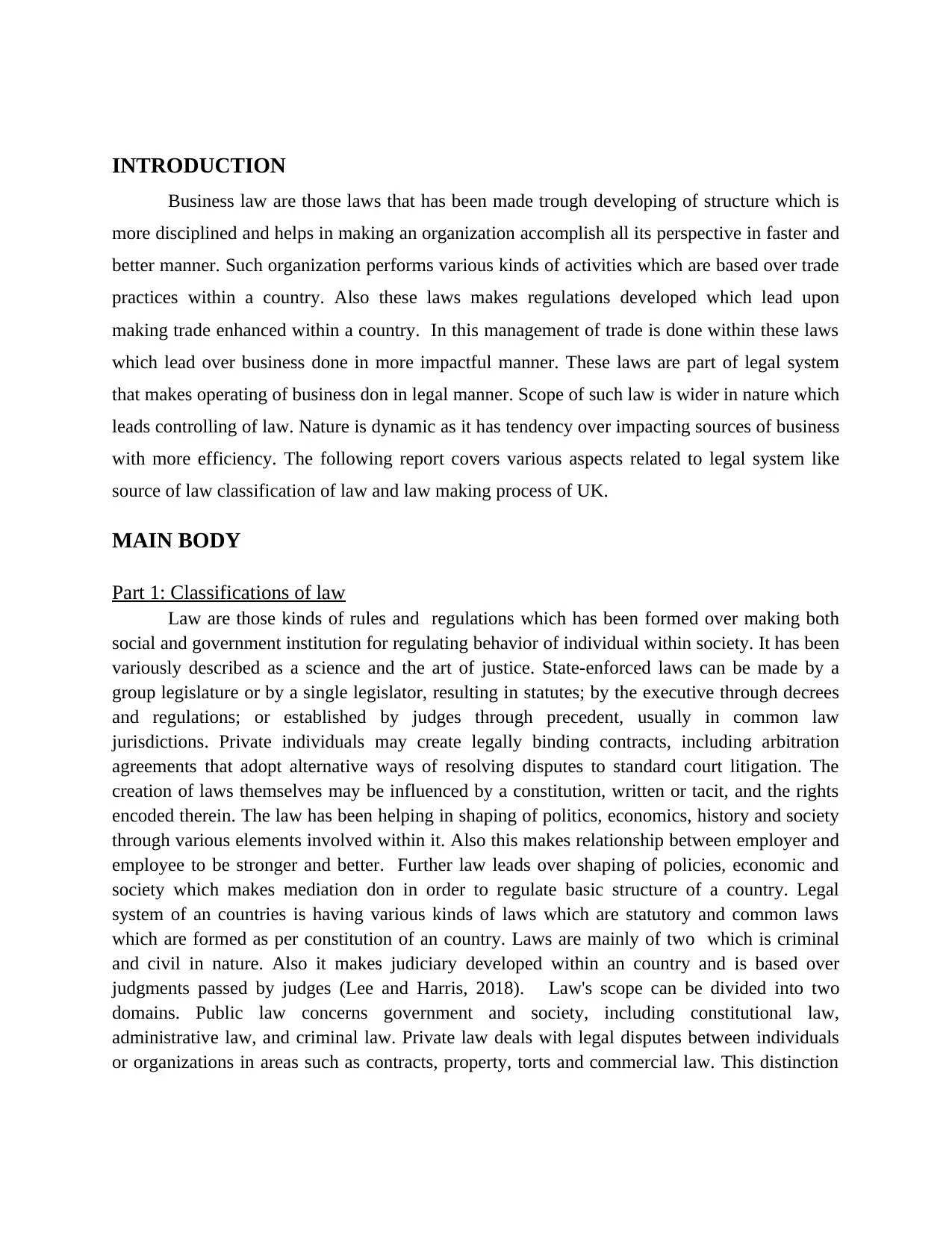
INTRODUCTION
Business law are those laws that has been made trough developing of structure which is
more disciplined and helps in making an organization accomplish all its perspective in faster and
better manner. Such organization performs various kinds of activities which are based over trade
practices within a country. Also these laws makes regulations developed which lead upon
making trade enhanced within a country. In this management of trade is done within these laws
which lead over business done in more impactful manner. These laws are part of legal system
that makes operating of business don in legal manner. Scope of such law is wider in nature which
leads controlling of law. Nature is dynamic as it has tendency over impacting sources of business
with more efficiency. The following report covers various aspects related to legal system like
source of law classification of law and law making process of UK.
MAIN BODY
Part 1: Classifications of law
Law are those kinds of rules and regulations which has been formed over making both
social and government institution for regulating behavior of individual within society. It has been
variously described as a science and the art of justice. State-enforced laws can be made by a
group legislature or by a single legislator, resulting in statutes; by the executive through decrees
and regulations; or established by judges through precedent, usually in common law
jurisdictions. Private individuals may create legally binding contracts, including arbitration
agreements that adopt alternative ways of resolving disputes to standard court litigation. The
creation of laws themselves may be influenced by a constitution, written or tacit, and the rights
encoded therein. The law has been helping in shaping of politics, economics, history and society
through various elements involved within it. Also this makes relationship between employer and
employee to be stronger and better. Further law leads over shaping of policies, economic and
society which makes mediation don in order to regulate basic structure of a country. Legal
system of an countries is having various kinds of laws which are statutory and common laws
which are formed as per constitution of an country. Laws are mainly of two which is criminal
and civil in nature. Also it makes judiciary developed within an country and is based over
judgments passed by judges (Lee and Harris, 2018). Law's scope can be divided into two
domains. Public law concerns government and society, including constitutional law,
administrative law, and criminal law. Private law deals with legal disputes between individuals
or organizations in areas such as contracts, property, torts and commercial law. This distinction
Business law are those laws that has been made trough developing of structure which is
more disciplined and helps in making an organization accomplish all its perspective in faster and
better manner. Such organization performs various kinds of activities which are based over trade
practices within a country. Also these laws makes regulations developed which lead upon
making trade enhanced within a country. In this management of trade is done within these laws
which lead over business done in more impactful manner. These laws are part of legal system
that makes operating of business don in legal manner. Scope of such law is wider in nature which
leads controlling of law. Nature is dynamic as it has tendency over impacting sources of business
with more efficiency. The following report covers various aspects related to legal system like
source of law classification of law and law making process of UK.
MAIN BODY
Part 1: Classifications of law
Law are those kinds of rules and regulations which has been formed over making both
social and government institution for regulating behavior of individual within society. It has been
variously described as a science and the art of justice. State-enforced laws can be made by a
group legislature or by a single legislator, resulting in statutes; by the executive through decrees
and regulations; or established by judges through precedent, usually in common law
jurisdictions. Private individuals may create legally binding contracts, including arbitration
agreements that adopt alternative ways of resolving disputes to standard court litigation. The
creation of laws themselves may be influenced by a constitution, written or tacit, and the rights
encoded therein. The law has been helping in shaping of politics, economics, history and society
through various elements involved within it. Also this makes relationship between employer and
employee to be stronger and better. Further law leads over shaping of policies, economic and
society which makes mediation don in order to regulate basic structure of a country. Legal
system of an countries is having various kinds of laws which are statutory and common laws
which are formed as per constitution of an country. Laws are mainly of two which is criminal
and civil in nature. Also it makes judiciary developed within an country and is based over
judgments passed by judges (Lee and Harris, 2018). Law's scope can be divided into two
domains. Public law concerns government and society, including constitutional law,
administrative law, and criminal law. Private law deals with legal disputes between individuals
or organizations in areas such as contracts, property, torts and commercial law. This distinction
⊘ This is a preview!⊘
Do you want full access?
Subscribe today to unlock all pages.

Trusted by 1+ million students worldwide
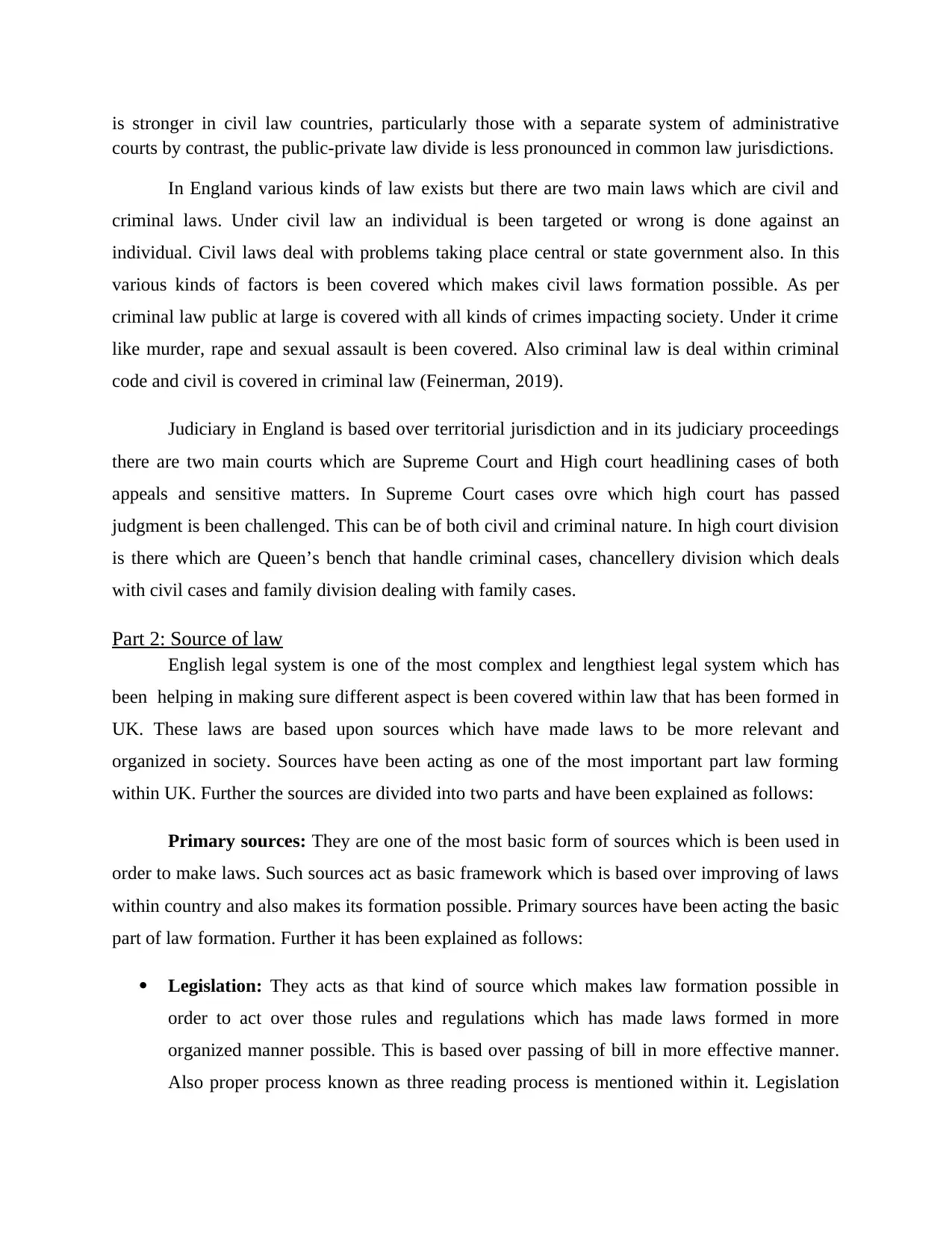
is stronger in civil law countries, particularly those with a separate system of administrative
courts by contrast, the public-private law divide is less pronounced in common law jurisdictions.
In England various kinds of law exists but there are two main laws which are civil and
criminal laws. Under civil law an individual is been targeted or wrong is done against an
individual. Civil laws deal with problems taking place central or state government also. In this
various kinds of factors is been covered which makes civil laws formation possible. As per
criminal law public at large is covered with all kinds of crimes impacting society. Under it crime
like murder, rape and sexual assault is been covered. Also criminal law is deal within criminal
code and civil is covered in criminal law (Feinerman, 2019).
Judiciary in England is based over territorial jurisdiction and in its judiciary proceedings
there are two main courts which are Supreme Court and High court headlining cases of both
appeals and sensitive matters. In Supreme Court cases ovre which high court has passed
judgment is been challenged. This can be of both civil and criminal nature. In high court division
is there which are Queen’s bench that handle criminal cases, chancellery division which deals
with civil cases and family division dealing with family cases.
Part 2: Source of law
English legal system is one of the most complex and lengthiest legal system which has
been helping in making sure different aspect is been covered within law that has been formed in
UK. These laws are based upon sources which have made laws to be more relevant and
organized in society. Sources have been acting as one of the most important part law forming
within UK. Further the sources are divided into two parts and have been explained as follows:
Primary sources: They are one of the most basic form of sources which is been used in
order to make laws. Such sources act as basic framework which is based over improving of laws
within country and also makes its formation possible. Primary sources have been acting the basic
part of law formation. Further it has been explained as follows:
Legislation: They acts as that kind of source which makes law formation possible in
order to act over those rules and regulations which has made laws formed in more
organized manner possible. This is based over passing of bill in more effective manner.
Also proper process known as three reading process is mentioned within it. Legislation
courts by contrast, the public-private law divide is less pronounced in common law jurisdictions.
In England various kinds of law exists but there are two main laws which are civil and
criminal laws. Under civil law an individual is been targeted or wrong is done against an
individual. Civil laws deal with problems taking place central or state government also. In this
various kinds of factors is been covered which makes civil laws formation possible. As per
criminal law public at large is covered with all kinds of crimes impacting society. Under it crime
like murder, rape and sexual assault is been covered. Also criminal law is deal within criminal
code and civil is covered in criminal law (Feinerman, 2019).
Judiciary in England is based over territorial jurisdiction and in its judiciary proceedings
there are two main courts which are Supreme Court and High court headlining cases of both
appeals and sensitive matters. In Supreme Court cases ovre which high court has passed
judgment is been challenged. This can be of both civil and criminal nature. In high court division
is there which are Queen’s bench that handle criminal cases, chancellery division which deals
with civil cases and family division dealing with family cases.
Part 2: Source of law
English legal system is one of the most complex and lengthiest legal system which has
been helping in making sure different aspect is been covered within law that has been formed in
UK. These laws are based upon sources which have made laws to be more relevant and
organized in society. Sources have been acting as one of the most important part law forming
within UK. Further the sources are divided into two parts and have been explained as follows:
Primary sources: They are one of the most basic form of sources which is been used in
order to make laws. Such sources act as basic framework which is based over improving of laws
within country and also makes its formation possible. Primary sources have been acting the basic
part of law formation. Further it has been explained as follows:
Legislation: They acts as that kind of source which makes law formation possible in
order to act over those rules and regulations which has made laws formed in more
organized manner possible. This is based over passing of bill in more effective manner.
Also proper process known as three reading process is mentioned within it. Legislation
Paraphrase This Document
Need a fresh take? Get an instant paraphrase of this document with our AI Paraphraser
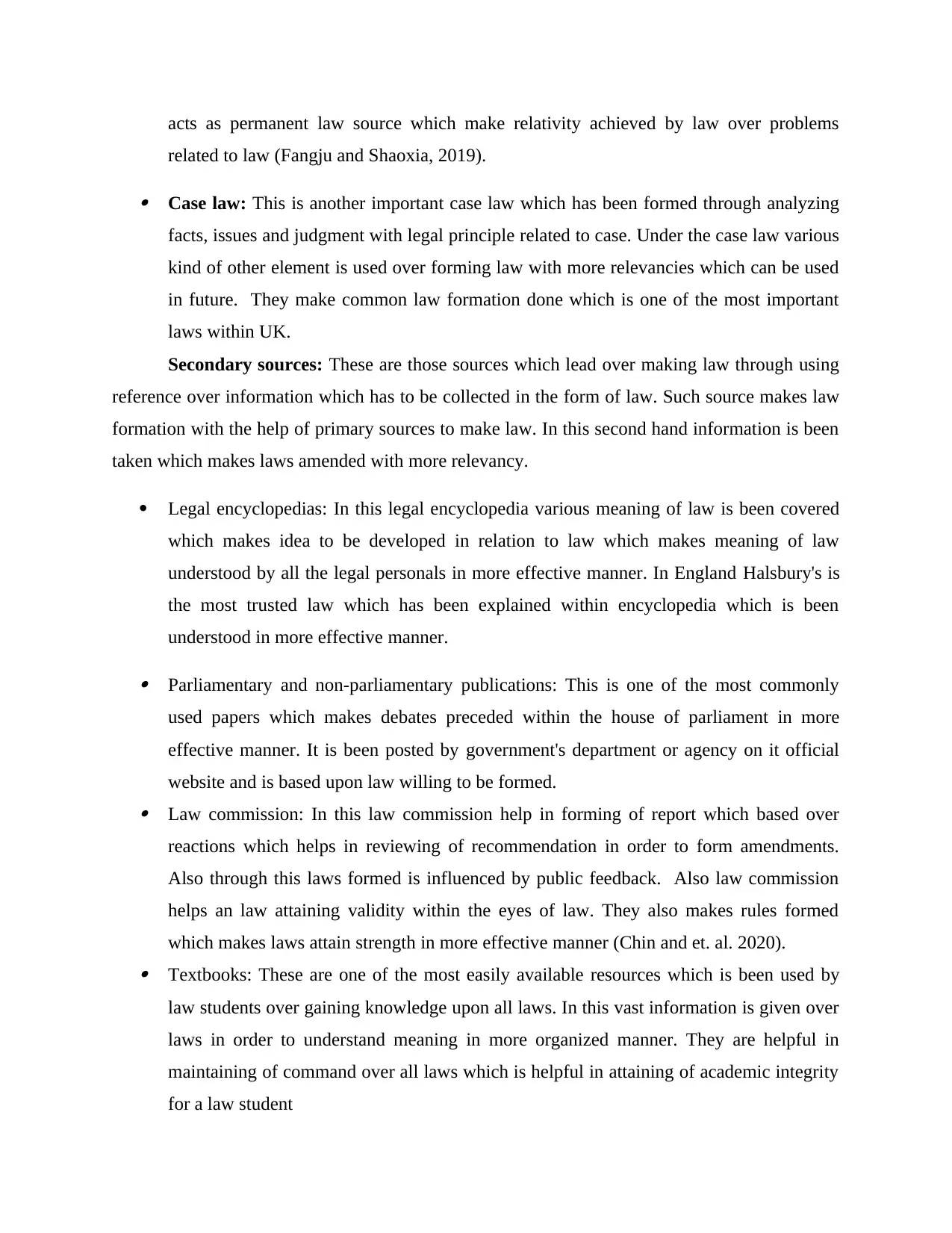
acts as permanent law source which make relativity achieved by law over problems
related to law (Fangju and Shaoxia, 2019).
Case law: This is another important case law which has been formed through analyzing
facts, issues and judgment with legal principle related to case. Under the case law various
kind of other element is used over forming law with more relevancies which can be used
in future. They make common law formation done which is one of the most important
laws within UK.
Secondary sources: These are those sources which lead over making law through using
reference over information which has to be collected in the form of law. Such source makes law
formation with the help of primary sources to make law. In this second hand information is been
taken which makes laws amended with more relevancy.
Legal encyclopedias: In this legal encyclopedia various meaning of law is been covered
which makes idea to be developed in relation to law which makes meaning of law
understood by all the legal personals in more effective manner. In England Halsbury's is
the most trusted law which has been explained within encyclopedia which is been
understood in more effective manner.
Parliamentary and non-parliamentary publications: This is one of the most commonly
used papers which makes debates preceded within the house of parliament in more
effective manner. It is been posted by government's department or agency on it official
website and is based upon law willing to be formed. Law commission: In this law commission help in forming of report which based over
reactions which helps in reviewing of recommendation in order to form amendments.
Also through this laws formed is influenced by public feedback. Also law commission
helps an law attaining validity within the eyes of law. They also makes rules formed
which makes laws attain strength in more effective manner (Chin and et. al. 2020). Textbooks: These are one of the most easily available resources which is been used by
law students over gaining knowledge upon all laws. In this vast information is given over
laws in order to understand meaning in more organized manner. They are helpful in
maintaining of command over all laws which is helpful in attaining of academic integrity
for a law student
related to law (Fangju and Shaoxia, 2019).
Case law: This is another important case law which has been formed through analyzing
facts, issues and judgment with legal principle related to case. Under the case law various
kind of other element is used over forming law with more relevancies which can be used
in future. They make common law formation done which is one of the most important
laws within UK.
Secondary sources: These are those sources which lead over making law through using
reference over information which has to be collected in the form of law. Such source makes law
formation with the help of primary sources to make law. In this second hand information is been
taken which makes laws amended with more relevancy.
Legal encyclopedias: In this legal encyclopedia various meaning of law is been covered
which makes idea to be developed in relation to law which makes meaning of law
understood by all the legal personals in more effective manner. In England Halsbury's is
the most trusted law which has been explained within encyclopedia which is been
understood in more effective manner.
Parliamentary and non-parliamentary publications: This is one of the most commonly
used papers which makes debates preceded within the house of parliament in more
effective manner. It is been posted by government's department or agency on it official
website and is based upon law willing to be formed. Law commission: In this law commission help in forming of report which based over
reactions which helps in reviewing of recommendation in order to form amendments.
Also through this laws formed is influenced by public feedback. Also law commission
helps an law attaining validity within the eyes of law. They also makes rules formed
which makes laws attain strength in more effective manner (Chin and et. al. 2020). Textbooks: These are one of the most easily available resources which is been used by
law students over gaining knowledge upon all laws. In this vast information is given over
laws in order to understand meaning in more organized manner. They are helpful in
maintaining of command over all laws which is helpful in attaining of academic integrity
for a law student
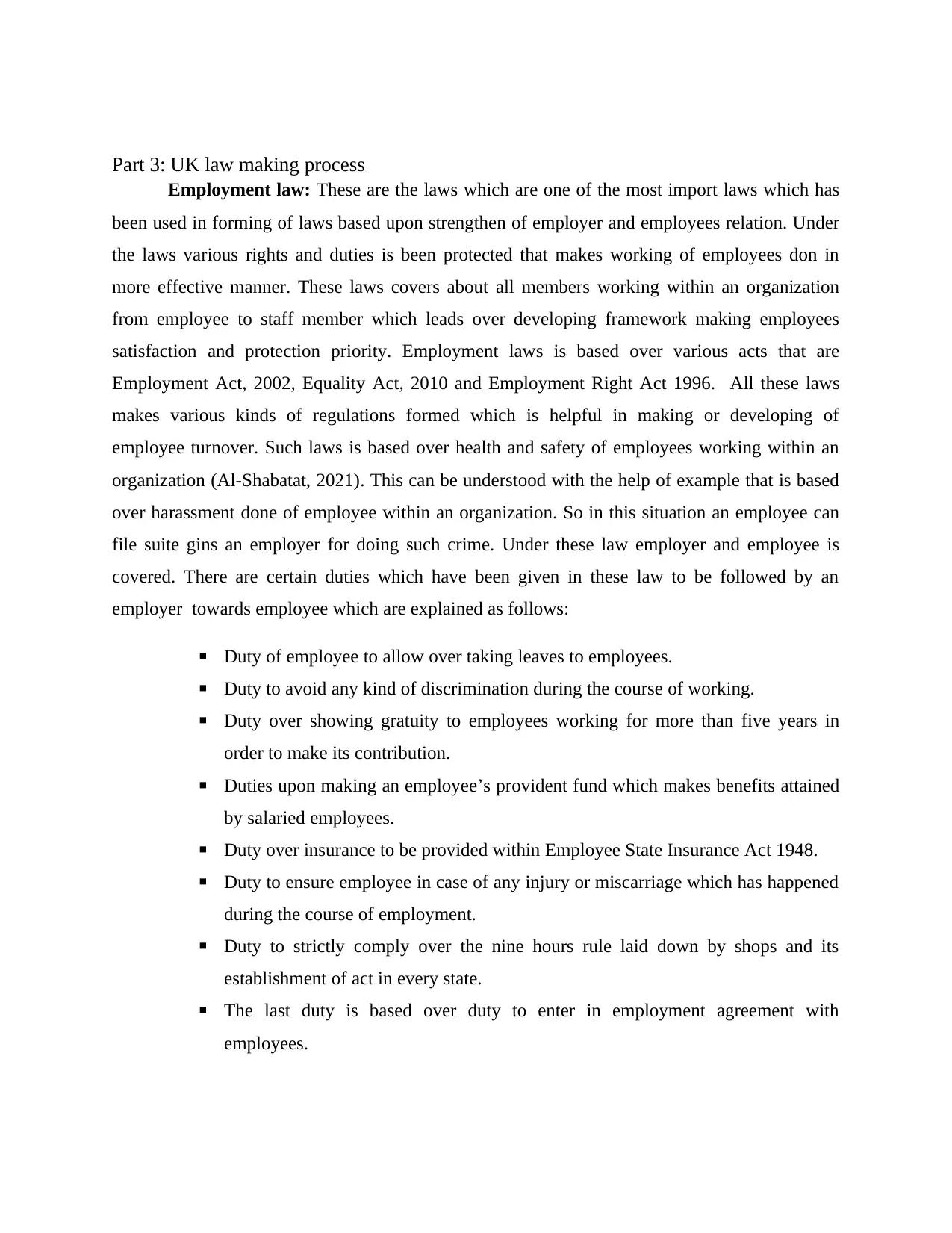
Part 3: UK law making process
Employment law: These are the laws which are one of the most import laws which has
been used in forming of laws based upon strengthen of employer and employees relation. Under
the laws various rights and duties is been protected that makes working of employees don in
more effective manner. These laws covers about all members working within an organization
from employee to staff member which leads over developing framework making employees
satisfaction and protection priority. Employment laws is based over various acts that are
Employment Act, 2002, Equality Act, 2010 and Employment Right Act 1996. All these laws
makes various kinds of regulations formed which is helpful in making or developing of
employee turnover. Such laws is based over health and safety of employees working within an
organization (Al-Shabatat, 2021). This can be understood with the help of example that is based
over harassment done of employee within an organization. So in this situation an employee can
file suite gins an employer for doing such crime. Under these law employer and employee is
covered. There are certain duties which have been given in these law to be followed by an
employer towards employee which are explained as follows:
▪ Duty of employee to allow over taking leaves to employees.
▪ Duty to avoid any kind of discrimination during the course of working.
▪ Duty over showing gratuity to employees working for more than five years in
order to make its contribution.
▪ Duties upon making an employee’s provident fund which makes benefits attained
by salaried employees.
▪ Duty over insurance to be provided within Employee State Insurance Act 1948.
▪ Duty to ensure employee in case of any injury or miscarriage which has happened
during the course of employment.
▪ Duty to strictly comply over the nine hours rule laid down by shops and its
establishment of act in every state.
▪ The last duty is based over duty to enter in employment agreement with
employees.
Employment law: These are the laws which are one of the most import laws which has
been used in forming of laws based upon strengthen of employer and employees relation. Under
the laws various rights and duties is been protected that makes working of employees don in
more effective manner. These laws covers about all members working within an organization
from employee to staff member which leads over developing framework making employees
satisfaction and protection priority. Employment laws is based over various acts that are
Employment Act, 2002, Equality Act, 2010 and Employment Right Act 1996. All these laws
makes various kinds of regulations formed which is helpful in making or developing of
employee turnover. Such laws is based over health and safety of employees working within an
organization (Al-Shabatat, 2021). This can be understood with the help of example that is based
over harassment done of employee within an organization. So in this situation an employee can
file suite gins an employer for doing such crime. Under these law employer and employee is
covered. There are certain duties which have been given in these law to be followed by an
employer towards employee which are explained as follows:
▪ Duty of employee to allow over taking leaves to employees.
▪ Duty to avoid any kind of discrimination during the course of working.
▪ Duty over showing gratuity to employees working for more than five years in
order to make its contribution.
▪ Duties upon making an employee’s provident fund which makes benefits attained
by salaried employees.
▪ Duty over insurance to be provided within Employee State Insurance Act 1948.
▪ Duty to ensure employee in case of any injury or miscarriage which has happened
during the course of employment.
▪ Duty to strictly comply over the nine hours rule laid down by shops and its
establishment of act in every state.
▪ The last duty is based over duty to enter in employment agreement with
employees.
⊘ This is a preview!⊘
Do you want full access?
Subscribe today to unlock all pages.

Trusted by 1+ million students worldwide
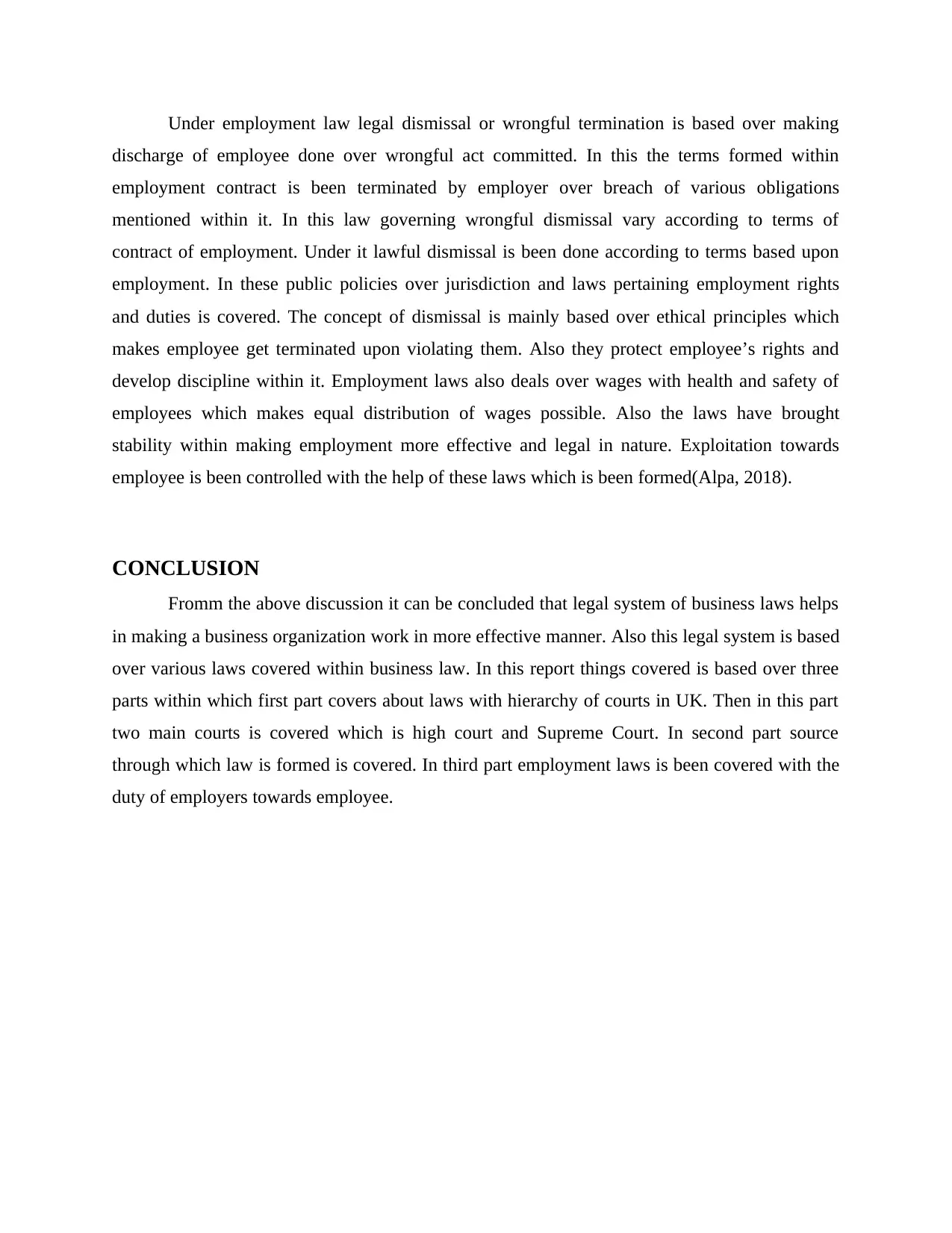
Under employment law legal dismissal or wrongful termination is based over making
discharge of employee done over wrongful act committed. In this the terms formed within
employment contract is been terminated by employer over breach of various obligations
mentioned within it. In this law governing wrongful dismissal vary according to terms of
contract of employment. Under it lawful dismissal is been done according to terms based upon
employment. In these public policies over jurisdiction and laws pertaining employment rights
and duties is covered. The concept of dismissal is mainly based over ethical principles which
makes employee get terminated upon violating them. Also they protect employee’s rights and
develop discipline within it. Employment laws also deals over wages with health and safety of
employees which makes equal distribution of wages possible. Also the laws have brought
stability within making employment more effective and legal in nature. Exploitation towards
employee is been controlled with the help of these laws which is been formed(Alpa, 2018).
CONCLUSION
Fromm the above discussion it can be concluded that legal system of business laws helps
in making a business organization work in more effective manner. Also this legal system is based
over various laws covered within business law. In this report things covered is based over three
parts within which first part covers about laws with hierarchy of courts in UK. Then in this part
two main courts is covered which is high court and Supreme Court. In second part source
through which law is formed is covered. In third part employment laws is been covered with the
duty of employers towards employee.
discharge of employee done over wrongful act committed. In this the terms formed within
employment contract is been terminated by employer over breach of various obligations
mentioned within it. In this law governing wrongful dismissal vary according to terms of
contract of employment. Under it lawful dismissal is been done according to terms based upon
employment. In these public policies over jurisdiction and laws pertaining employment rights
and duties is covered. The concept of dismissal is mainly based over ethical principles which
makes employee get terminated upon violating them. Also they protect employee’s rights and
develop discipline within it. Employment laws also deals over wages with health and safety of
employees which makes equal distribution of wages possible. Also the laws have brought
stability within making employment more effective and legal in nature. Exploitation towards
employee is been controlled with the help of these laws which is been formed(Alpa, 2018).
CONCLUSION
Fromm the above discussion it can be concluded that legal system of business laws helps
in making a business organization work in more effective manner. Also this legal system is based
over various laws covered within business law. In this report things covered is based over three
parts within which first part covers about laws with hierarchy of courts in UK. Then in this part
two main courts is covered which is high court and Supreme Court. In second part source
through which law is formed is covered. In third part employment laws is been covered with the
duty of employers towards employee.
Paraphrase This Document
Need a fresh take? Get an instant paraphrase of this document with our AI Paraphraser
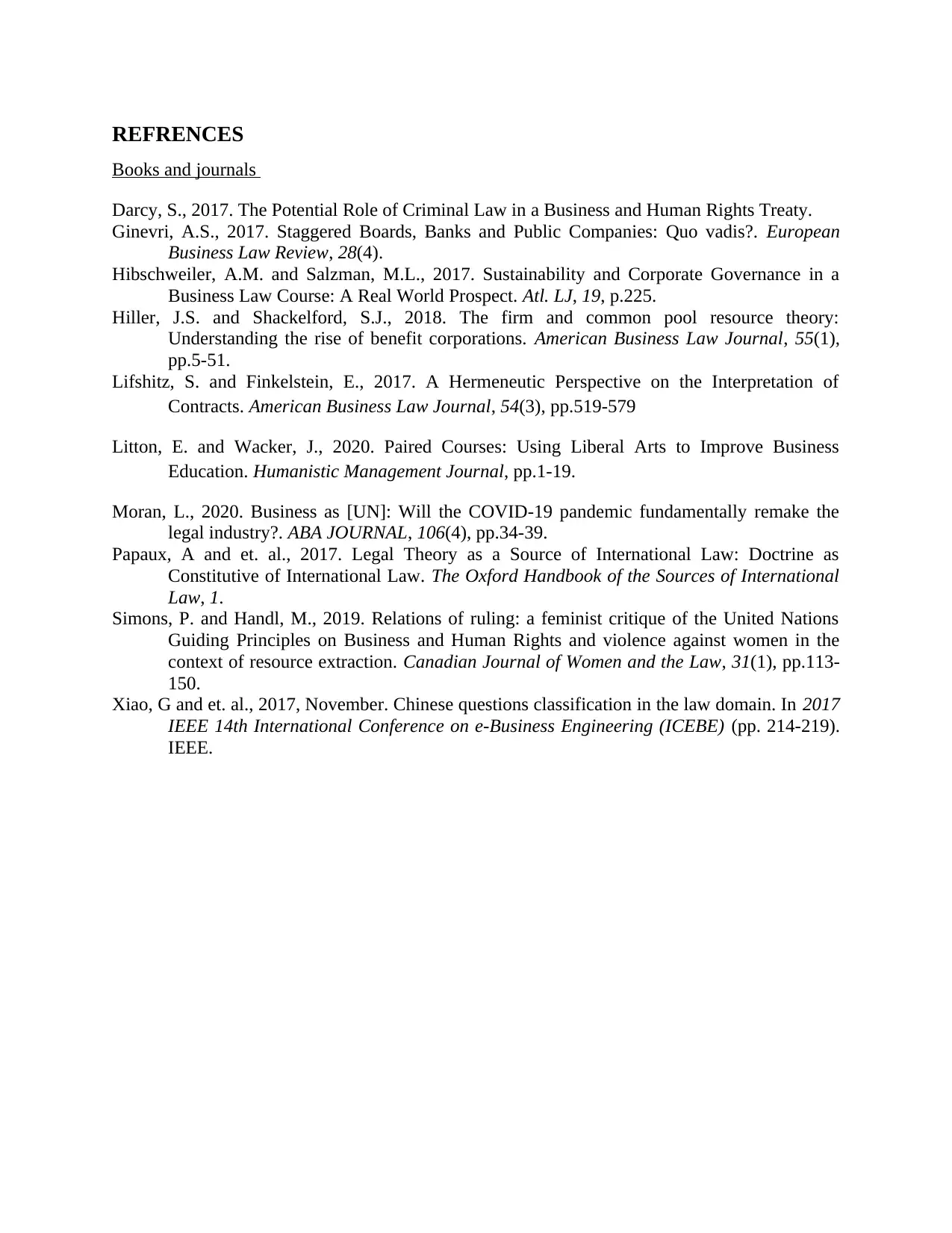
REFRENCES
Books and journals
Darcy, S., 2017. The Potential Role of Criminal Law in a Business and Human Rights Treaty.
Ginevri, A.S., 2017. Staggered Boards, Banks and Public Companies: Quo vadis?. European
Business Law Review, 28(4).
Hibschweiler, A.M. and Salzman, M.L., 2017. Sustainability and Corporate Governance in a
Business Law Course: A Real World Prospect. Atl. LJ, 19, p.225.
Hiller, J.S. and Shackelford, S.J., 2018. The firm and common pool resource theory:
Understanding the rise of benefit corporations. American Business Law Journal, 55(1),
pp.5-51.
Lifshitz, S. and Finkelstein, E., 2017. A Hermeneutic Perspective on the Interpretation of
Contracts. American Business Law Journal, 54(3), pp.519-579
Litton, E. and Wacker, J., 2020. Paired Courses: Using Liberal Arts to Improve Business
Education. Humanistic Management Journal, pp.1-19.
Moran, L., 2020. Business as [UN]: Will the COVID-19 pandemic fundamentally remake the
legal industry?. ABA JOURNAL, 106(4), pp.34-39.
Papaux, A and et. al., 2017. Legal Theory as a Source of International Law: Doctrine as
Constitutive of International Law. The Oxford Handbook of the Sources of International
Law, 1.
Simons, P. and Handl, M., 2019. Relations of ruling: a feminist critique of the United Nations
Guiding Principles on Business and Human Rights and violence against women in the
context of resource extraction. Canadian Journal of Women and the Law, 31(1), pp.113-
150.
Xiao, G and et. al., 2017, November. Chinese questions classification in the law domain. In 2017
IEEE 14th International Conference on e-Business Engineering (ICEBE) (pp. 214-219).
IEEE.
Books and journals
Darcy, S., 2017. The Potential Role of Criminal Law in a Business and Human Rights Treaty.
Ginevri, A.S., 2017. Staggered Boards, Banks and Public Companies: Quo vadis?. European
Business Law Review, 28(4).
Hibschweiler, A.M. and Salzman, M.L., 2017. Sustainability and Corporate Governance in a
Business Law Course: A Real World Prospect. Atl. LJ, 19, p.225.
Hiller, J.S. and Shackelford, S.J., 2018. The firm and common pool resource theory:
Understanding the rise of benefit corporations. American Business Law Journal, 55(1),
pp.5-51.
Lifshitz, S. and Finkelstein, E., 2017. A Hermeneutic Perspective on the Interpretation of
Contracts. American Business Law Journal, 54(3), pp.519-579
Litton, E. and Wacker, J., 2020. Paired Courses: Using Liberal Arts to Improve Business
Education. Humanistic Management Journal, pp.1-19.
Moran, L., 2020. Business as [UN]: Will the COVID-19 pandemic fundamentally remake the
legal industry?. ABA JOURNAL, 106(4), pp.34-39.
Papaux, A and et. al., 2017. Legal Theory as a Source of International Law: Doctrine as
Constitutive of International Law. The Oxford Handbook of the Sources of International
Law, 1.
Simons, P. and Handl, M., 2019. Relations of ruling: a feminist critique of the United Nations
Guiding Principles on Business and Human Rights and violence against women in the
context of resource extraction. Canadian Journal of Women and the Law, 31(1), pp.113-
150.
Xiao, G and et. al., 2017, November. Chinese questions classification in the law domain. In 2017
IEEE 14th International Conference on e-Business Engineering (ICEBE) (pp. 214-219).
IEEE.
1 out of 8
Related Documents
Your All-in-One AI-Powered Toolkit for Academic Success.
+13062052269
info@desklib.com
Available 24*7 on WhatsApp / Email
![[object Object]](/_next/static/media/star-bottom.7253800d.svg)
Unlock your academic potential
Copyright © 2020–2025 A2Z Services. All Rights Reserved. Developed and managed by ZUCOL.





